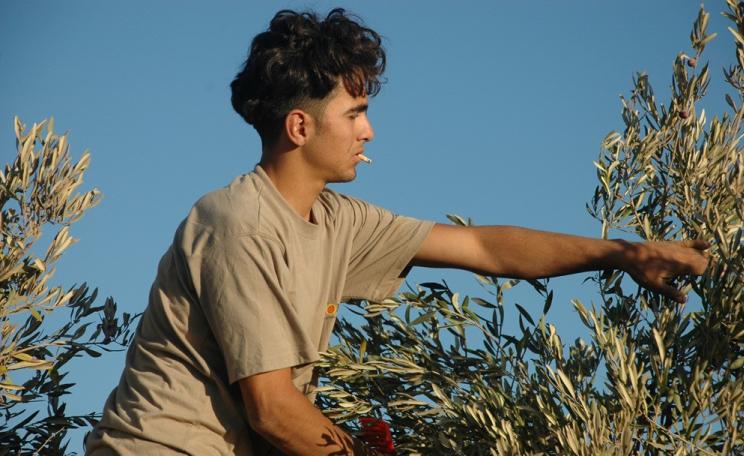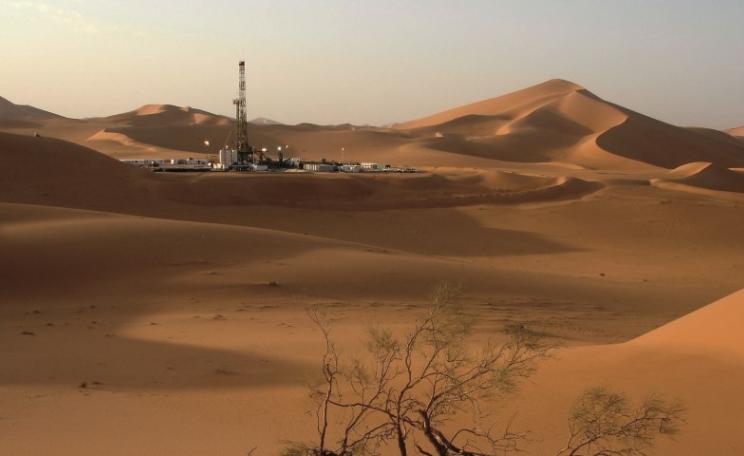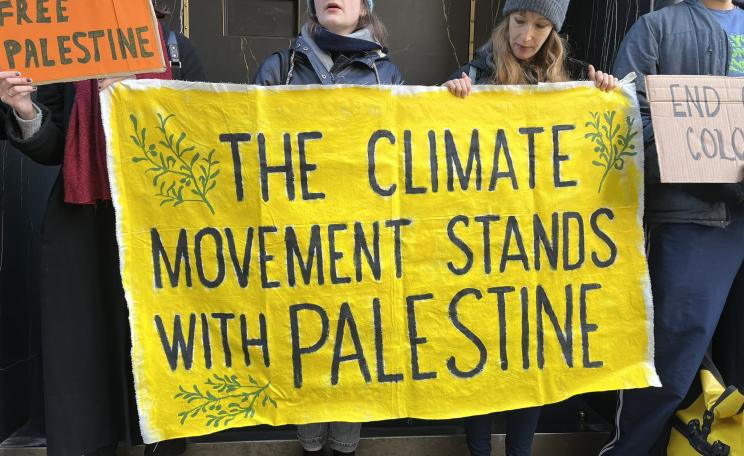Palestinians in the West Bank no longer have the same access to hospitals, airports, friends, family members.
Tel Aviv Airport, Israel. Wednesday, 6 September 2023. I was a 23-year-old white girl in a new country with only one language and a false sense of confidence. I got lost on the first day.
The trip out to the farm was brutal. The Tel Aviv bus station is an unmarked maze, and there were four buses total that I would need to take to arrive safely at the farm. It was later that I learned the ease of leaving Palestinian territory as an American in contrast to the mayhem of finding it in the first place.
This article has been published through the Ecologist Writers' Fund. We ask readers for donations to pay some authors £200 for their work. Please make a donation now. You can learn more about the fund, and make an application, on our website.
After two days, one helpful stranger, a couple tears, and lots of sweat, I arrived at the Tent of Nations farm near Bethlehem. I spent about two and a half weeks there with the Nassar family and various other volunteers.
Powerful
The farm was a beautiful experience where I learned farming techniques and bonded with visitors from all over the world. In between these wonderful moments, I also witnessed firsthand the daily oppressive nature of the Israeli apartheid regime.
Less than a month later my time with the Nassar family had come to its natural end. It hurt to leave them. I had made so many friends and had felt so much purpose in the work that I was doing on the farm. I searched the conditions of my flight out, hoping to find “no cancellation fee” in the print.
I departed for Spain on Monday, 25 September 2023,: Hamas led insurgents attacked Israel on Saturday, 7 October 2023.
The Nassar family is quite large. Nearly every day, a new sibling was mentioned in casual conversation. I spent time with only a few, or “The Big Three”, as I like to call them: Daoud, Daher, and Amal Nassar.
Amal is a powerful woman. She wore the same green work vest every day, and I never saw her sit down longer than it took her to finish a meal. Amal was the backbone of our daily life on the farm.
Advocating
She cooked for us, made sure we got the living areas clean each night, and texted in a feverish worry when one of us volunteers was out of sight. Everyone she met was a new family member.
Daher was the older brother of the three, and the most precious man you’ll ever meet. I was with him for most of my time on the farm. He showed me how to do most of the daily farm chores, from feeding the animals to flinging their manure.
We solved problems together such as changing the tire on a gigantic water cistern without a car jack, or saving a stray kitten from a hole in the ground, after which he would tell me I was a “good woman with a good brain”. Daher and his kindness are the reasons I made an effort to stay on the farm.
Palestinians in the West Bank no longer have the same access to hospitals, airports, friends, family members.
Lastly, there was Daoud (pictured), the face of the Tent of Nations cause. Daoud is fluent in both English and German, and he speaks both with an air that draws you in to listen.
He is also the busiest man on earth. Some days you’ll catch him in the middle of crisis management on the farm, but he spends most of his time advocating for peace between Israel and Palestine to visitors.
Faith
The Tent of Nations farm, also known as Daher’s Vineyard, is big, dry, and is home to so much life. Even before you enter the gates, you can find vine after vine of grapes along the fences; olive trees and sage bushes meet you at the door.
The Tent of Nations website states: “We want to develop a positive approach to conflict management. In the face of great injustice, we know that we should not hate, despair or flee. We refuse to be enemies and we try to transform our pain and frustration into positive actions that will help us to create a better future.”
Wandering further along the path, you’ll begin to notice other signs of life and hope among the cracking, dry land. In several places, the Nassars have placed stones painted with quotes in English from Gandhi and other historical figures– all dedicated to peaceful resolution.
Once the permanent home of the Nassar family lineage, Tent of Nations now serves as a resting place to those who want to learn about the political conflicts that affect the Palestinian people– some are day visitors, but most are volunteers who stay for weeks at a time, sometimes months, learning about agricultural sustainability and peaceful resolution.
Bridge
The Nassar family believes in and advocates for “building a bridge between people.” This is according to their Christian faith, and the core belief of Jesus’ radical impact on humanity. With a trust in God’s sense of justice rather than their own, ToN’s main goal is to educate people on the importance of our connection to the earth and to its people.
For the Nassars, as well as myself, Jesus’ life is the ultimate model for how to live and love well. He was a rebel of kindness, a friend to the outcast. Prince of Peace.
Paul the Apostle, in Romans 12:17-21, says this about how to treat one another: ”Repay no one evil for evil, but give thought to do what is honorable in the sight of all. If possible, so far as it depends on you, live peaceably with all. Beloved, never avenge yourselves, but leave it to the wrath of God, for it is written, ´Vengeance is mine, I will repay, says the Lord.”
To the contrary, “if your enemy is hungry, feed him; if he is thirsty, give him something to drink; for by so doing you will heap burning coals on his head.´Do not be overcome by evil, but overcome evil with good. ”
Harassment
The building of Israeli settlements in the West Bank has been ongoing ever since the occupation in 1967 as a result of the Six Day War. This phenomenon hit home for the Nassars in 1991, when Israeli authorities claimed the farm as “state land”.
This declaration is unlawful due to the overwhelming evidence that the Nassar family rightfully owns the farm with papers and registrations to prove it.
Despite the obvious opposition of the law, five settlements now surround the farm, almost resembling watch towers. Every day, there seemed to be a significant piece of construction developing, intruding even further on the Nassars.
The settlements have developed into boarding schools for young Israelis. The structures are growing everyday to resemble small cities, pushing ever closer into the Nassar family land. Along with these illegal settlements, the Nassars have had to deal with the re-registration of their land. As of December third, their court date has been postponed yet again, with no new date set.
If the settlements and legal battles weren’t enough frustration, the Nassars have also had to deal with harassment from Israeli soldiers. Some of this was in the form of physical attacks, whether against their olive trees or the Nassar family members themselves, but most of these cases are unwanted, unauthorised visits from Israeli authorities.
Barrier
I was witness to one of these visits. One morning, I was in the kitchen washing dishes from breakfast. Through the small window in front of me, I could see from a distance the main path that runs through the farm…and two soldiers walking along it, guns in hand.
Two of the braver volunteers that encountered the soldiers decided to ask how they had gotten onto the grounds. The farm is sealed by two gates in which Israeli soldiers have not been given a key.
“We just walked in,” they responded nonchalantly, as if to wave off the volunteers. The volunteers had their theories, but we never did find out how they entered the vineyard. Two weeks later, I flew out from the Tel Aviv airport. Two more weeks, and I learned that Israel had declared war on Palestine.
To put it bluntly, Israeli apartheid is not “breaking news”. Israel has been cornering the Palestinian people into smaller and smaller territories using the wall in the West Bank since June of 2002.
The construction of the wall began as a security tactic along the Green Line, but quickly evolved into an internationally unlawful barrier invading Palestinian territory.
Composure
The wall has been a source of inconvenience and devastation for Palestinian citizens in the West Bank. Areas that were once a five-minute walk are now a thirty-minute drive, with no guarantee that Israeli authorities will let them through the ever-present checkpoints.
Palestinians in the West Bank no longer have the same access to hospitals, airports, friends, family members. This has led to separation of families, loss of employment, and even unnecessary deaths. This oppression did not begin on Saturday, 7 October.
I learned about the attack from Hamas in a text from my mother one morning in Malaga, Spain. I don’t know how to describe the kind of devastation, fear, and guilt to its fullest extent. I found myself in bed for days.
Two weeks later, I found myself on a flight home to Tennessee, almost two months earlier than planned. For a month after, I found it difficult to hold my composure. Even writing this paragraph took me over a month to finish. War is a difficult thing to face for someone who has never come nose to nose with it.
Palestinians, however, see it in their everyday lives: their drive to work, a trip to the store, even walking down the street to a friend's house.
Safe
A friend of mine, a woman I met in Bethlehem, described her people as something so powerful and so resilient: “Peace will affect both sides.
"We have to stop this blood – I can't even look at the TV. As a Palestinian, however, my people here are very resilient.” T
hey are proud to be Palestinian, and believe that peace will prevail. As for the farm, there are not many recent updates. In October, I got a message from Daoud with the information that although volunteers had been evacuated from the farm and the situation was escalating, they had been safe. I have reached out several times since then with no response.
The Tent of Nations website in which Daoud posts regular updates seems to have been taken down. However, he posted on Facebook on December 3rd with a small update on the ongoing legal battle for the ownership of their land.
Justice
“Dear friends of Tent of Nations,
This is to extend our gratitude for the numerous messages and phone calls of support and solidarity that we have received. Your words of encouragement have provided us with immeasurable strength in this dark time of sorrow and pain.
I am writing to let you know that the court session regarding the reregistration of the farm, which was scheduled for the 4th of December, has been postponed. No new date has been communicated to us yet, but we will let you know as soon as we know.
We remain resolute and even more determined to continue our journey for justice and embody the light that overcomes the darkness.
We kindly request that you continue to keep us in your thoughts and prayers.
With deepest appreciation”
Children
To the extent of my knowledge, the Nassar family is safe, along with the friends I met in Bethlehem. Although not in the direct line of fire, unrest in the West Bank rises with each passing day.
In the streets of Bethlehem, IDF vehicles are now taking the place of the area I saw full of local traffic, business, and life. Israeli soldiers have been seen bullying local Palestinians. There have been multiple deaths.
The most recent report from Al Jazeera News, an Arabic news source handling breaking news, live coverage, and conducting investigative journalism, has stated that “at least 273 people, including 63 children, have been killed in the occupied West Bank since October 7th.”
Resolution
Here are more detailed descriptions, reported on December 9th, 2023, of only a handful of these attacks in the West Bank:
“The Israeli military has carried out multiple raids in the occupied West Bank as heavy fighting continued across the Gaza Strip a day after the United States used its veto power in the United Nations Security Council to block overwhelming demands for an immediate humanitarian ceasefire.
“The raids that started overnight and continued into Saturday took place near Jenin, Qalqilya, Nablus, Jericho, Ramallah, Bethlehem and Hebron as at least 15 Palestinians were detained across the region, the Palestinian Prisoner’s Society told Al Jazeera.
“Two teenagers were killed by Israeli forces – the first was killed in Dura, in the south of Hebron, the Palestinian Ministry of Health said. Israeli forces also shot dead 17-year-old Mahmoud Bassem Abou Hania in the occupied West Bank town of Azzun of Qalqilya, the Palestinian Ministry of Health said.”
Although Palestinians, in Gaza as well as the West Bank, are living in a real-life nightmare, they still persist with hope for liberation. The Palestinian resilience is a powerful source of energy to absorb, especially for those of us facing these issues for what might be the first time.
That strength and persistence is important for us as Americans to adopt in order to make real change in our allyship to a nation so obviously drunk on military power. Peaceful resolution is possible, and we have every capability of pushing our leaders to support this view. Refuse to be enemies.
This Author
Emmalyne Karnes is a 23-year-old American from Chattanooga, Tennessee. She has always had a love for travel, people, music, and the environment, but after graduating in May 2023 with a degree in cultural anthropology, she has since realised that her true passion lies in her writing. Emmalyne’s goal is to use her degree in this way, focusing on activism and story-telling through an anthropological lens.
This article has been published through the Ecologist Writers' Fund. We ask readers for donations to pay some authors £200 for their work. Please make a donation now. You can learn more about the fund, and make an application, on our website.




